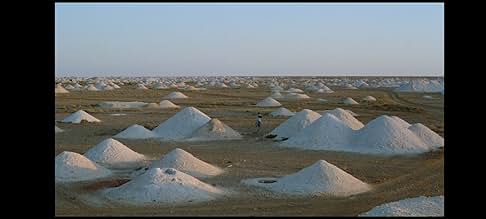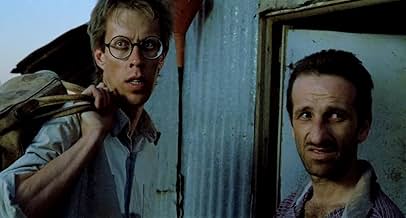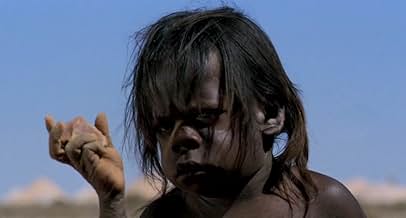Ein Geologe, der bei einem australischen Bergbauunternehmen angestellt ist, muss die Rechte einiger Ureinwohner anfechten, die ihr Land für heilig halten.Ein Geologe, der bei einem australischen Bergbauunternehmen angestellt ist, muss die Rechte einiger Ureinwohner anfechten, die ihr Land für heilig halten.Ein Geologe, der bei einem australischen Bergbauunternehmen angestellt ist, muss die Rechte einiger Ureinwohner anfechten, die ihr Land für heilig halten.
- Auszeichnungen
- 2 Gewinne & 2 Nominierungen insgesamt
Empfohlene Bewertungen
His films are simply conceived, like Lynch's, but once he gets rolling, his intuitions take him to strange, exotic corners of the soul. There he leaves traces that last. I love the man's work, much of it. I love the fact that he really seems to be driven by urges that seem to accidentally result in something that can cross the distribution divide to reach me. This is no small feat; the films I watch that have ideas and matter are what maybe a millionth, a billionth? of the similarly deep insights and artifacts that would have similar effect in me, but which cannot cross that divide.
When I watch his work, some of which I reserve for the future, it is a dip into the film of Herzog. Failures add to this. Risks that did not pan out for him, do for me.
This film has some heavy disadvantages. He is in Australia and he simply does not understand that to photograph the land the way it affects its inhabitants, you have to photograph nothing. Nothing is what matters. But he gives us a tornado. Its beautiful and violent it even fits the story. He gives us unrelenting piles of boring waste. This too is effective in the film, but not of the place.
He misses both the place and he people. He does give us beautiful Aboriginal faces. He does celebrate them. But its from a deeply disturbing patriarchal, colonial perspective. There is some of this in his Peruvian adventures, but it is hidden in his respect for the Jungle. The natives are simply part of the terrain. He cannot do that here. This also suffers in that he felt it necessary to have an on-screen observer who "learns" the value of the place and turns from heading the mining effort to living with the people.
The result is that the film is overt in its sentiments, but everything works against its honesty. We are left with having to accept it locally, each scene as a sort of standalone taste: black patient faces staring out of pilot seats in an airplane given to them; a man on a witness stand testifying in a language no other soul on the planet understands; an old biddy waiting in the sun at a mine opening on the of chance that her beloved doggie will reappear; that tornado; the (overearnest) story of the sleeping green ants whose dreams we are.
This has value in those small pieces, pretty much throughout. But in the large, taken the way he intends it, its just a colonial German peering into a quaint culture as an ordinary tourist would. So it dilutes the greater story, the greater film of the man.
Ted's Evaluation -- 2 of 3: Has some interesting elements.
There is a small scene in an elevator that I remember as a transcendent cinematic moment.
Like so many of Herzog's films, it is deeply moving for reasons that aren't easy to put your finger on - often with Herzog it's an odd juxtaposition, an awkward silence, a strange edit, an inappropriate flash of humour or horror that produce a flash of insight.
This film, at the time, seemed conventional by Herzog's standards, but I still left the theatre feeling slightly drugged, always a good sign.
It's not to say some of Herzog's bits of character eccentricities aren't out of place. There's featured here amid the story of an aboriginal tribe peacefully protesting and standing their ground against construction on a sacred land of the title name various strange bits of business. My favorite was that mid-section involving the Aborigines asking for a plane, assumed on the part of the construction group as part of the negotiations, and features in one of the oddest parts of the movie the one black pilot from the Aussie air force who keeps singing "My baby does the hanky-panky" to himself. And there's some cool visuals of stock tornado footage and those barren wastelands and perplexing dunes and pyramid-hills in the desert plains that provide the director some choice locations to film. It's hard not to see for the Herzog fan some allotment of poetry.
But there are some problems that I couldn't quite ignore. Despite the acting force of Bruce Spence, who displays far more here as a gifted actor (contrary to what another IMDb reviewer said) and as more than just the kooky flier in the Mad Max movies, the acting is in general fairly weak and at best standard and too off-kilter. It's fairly distracting when Herzog can't quite corral his actors as well as with his technical skills; this also despite some real 'presence' with the two aboriginal chiefs. And certain big scenes, like the courtroom, aren't as effective as might have been intended and come off as dry and too naturalistic and stuffy.
And yet, even with these qualms, it's got some real courage and conviction with its message, which is that aside from the typical "respect the native culture" beat is that people need to learn to live together and not have cultures lost and squandered in the face of bigotry and imperialistic attitudes that should have been squashed decades ago. It's a very good, if not great, examination of a meeting of two societies and an identification of "the other" by a filmmaker willing to take it on. 7.5/10
Wusstest du schon
- WissenswertesThe whole story of the green ants was made up by Werner Herzog, it's not a part of genuine Aboriginal folklore. However the courtroom incident where a secret artifact is revealed, to the bemusement of the judge, is based on a real incident.
- Zitate
Lance Hackett: The situation, your Honor, is this man is the the sacred custodian to the secrets of this tribe. And his tribe has died out. He is the sole and final survivor of his people, his clan. They call him the mute, because there is nobody left on this earth for him to speak with.
- SoundtracksRequiem Op. 48
Music by Gabriel Fauré
Top-Auswahl
- How long is Where the Green Ants Dream?Powered by Alexa
Details
- Erscheinungsdatum
- Herkunftsland
- Sprache
- Auch bekannt als
- Where the Green Ants Dream
- Drehorte
- Produktionsfirmen
- Weitere beteiligte Unternehmen bei IMDbPro anzeigen
- Laufzeit1 Stunde 40 Minuten
- Sound-Mix
- Seitenverhältnis
- 1.85 : 1
Zu dieser Seite beitragen































